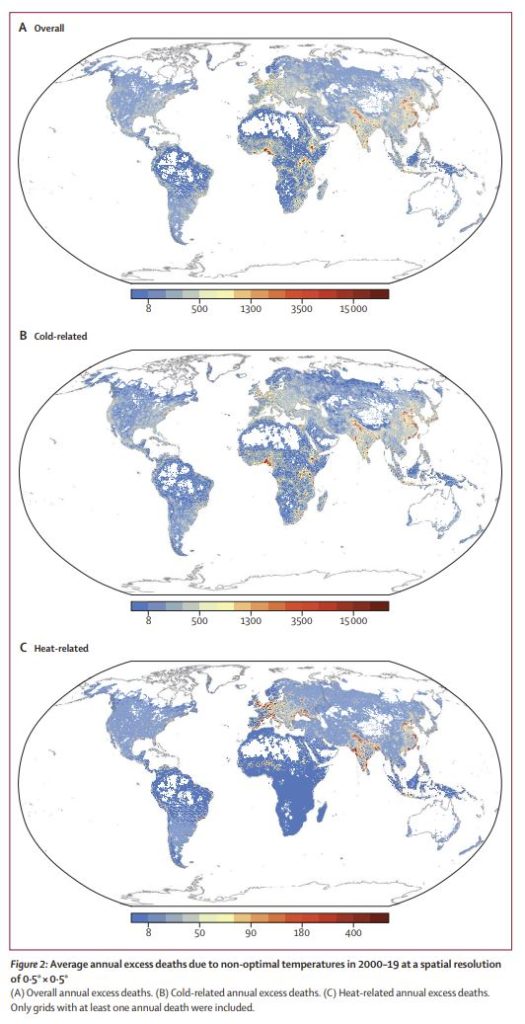In a surprise, mammals with a body temperature of 37 degrees Celsius do better in warmer weather
Who knew that global warming has saved 166,000 lives a year every year since 2000? Burn coal, save the world! Some countries are just not doing enough to help. Does your nation have a Net-100 Plan for 2050 to double CO2 emissions? It’s never too late to start. Countries that leave coal deposits undeveloped are not part of the solution.

Click to enlarge
Climate Change Saves More Lives Than You’d Think
Bjorn Lomborg, Wall Street Journal
… climate change has saved more lives from temperature-related deaths than it has taken. Heat deaths make up about 1% of global fatalities a year—almost 600,000 deaths—but cold kills eight times as many people, totaling 4.5 million deaths annually. As temperatures have risen since 2000, heat deaths have increased 0.21%, while cold deaths have dropped 0.51%. Today about 116,000 more people die from heat each year, but 283,000 fewer die from cold. Global warming now prevents more than 166,000 temperature-related fatalities annually.
Headlines predictably said “Heat Deaths Up 50%” since the year 2000. But Lomborg points out that most all of that rise was due to there being more old people:
Global warming does cause more heat deaths, but the editors’ statistic is deceptive. They say global heat deaths have gone up by 54% among old people in the past 20 years, but they fail to mention that the number of old people has risen by almost as much. Demographics drove most of the rise, not climate change.
The population of people over 65 increased from 423 m in the year 2000 to 729 million in 2020. So the older demographic is 70% larger in the last twenty years.
From the paper — 5 million people die of heat or cold each year:
We found that there were 5,083,173 deaths per year associated with non-optimal temperatures, accounting for 9·43% of global deaths and equating to 74 temperature-related excess deaths per 100000 residents. Most excess deaths were linked to cold temperatures (8·52%), whereas fewer were linked to hot temperatures (0·91%).
Previous studies showed that the thing that saved people from heat death in the 20th Century was — airconditioners .
If we want to save the poor in Africa from dying of heat waves, the best thing we can do is help them get air conditioning and the cheap electricity to run it.
★ ★ ★
Facebook use fake Fact-checkers to block this information
Bjorn Lomborg wrote this up in the New York Post in August. Some self appointed group called Climate Feedback, did some fact checking on things that Lomborg didn’t say, and found those imaginary things were “unsupported”. Facebook then used that to slap a “False Information” label on Lomborgs message saying “Checked by independent fact-checkers”.
Lomborg explains Climate Feedback actually make up the quote they attribute to him. By mis-paraphrasing him and putting two different sentences together, they invent an error that they can “fact check”.
Climate Depot posted this summary:

The top and bottom halves of the “Claim” are part quote and part fabrication.
Who fact checks the fact-checkers? Certainly not Facebook, not the government and not the media. Facebook gets legal protection from the government but none of the responsibility or accountability that go with that. Big Government gives Facebook a free gift, and Facebook returns the favour. It’s a protection racket.
It’s lies for the climate now. Tell the world, teach the children.
REFERENCES
Alan Barreca, Karen Clay, Olivier Deschenes, Michael Greenstone, and Joseph S. Shapiro (2016) Adapting to Climate Change: The Remarkable Decline in the US Temperature-Mortality Relationship over the Twentieth Century, Journal of Political Economy 124:1, 105-159 [Berkley PDF]
Qi Zhao et al (2021) Global, regional, and national burden of mortality associated with non-optimal ambient temperatures from 2000 to 2019: a three-stage modelling study, The Lancet, DOI:https://doi.org/10.1016/S2542-5196(21)00081-4